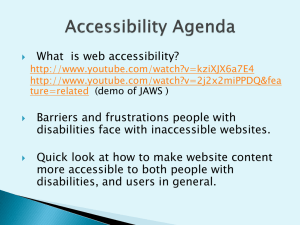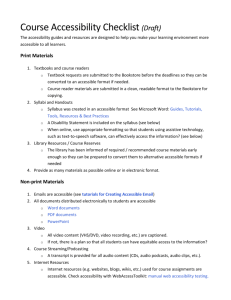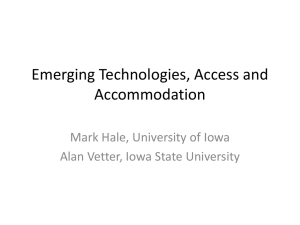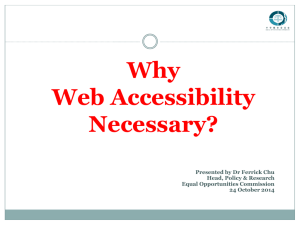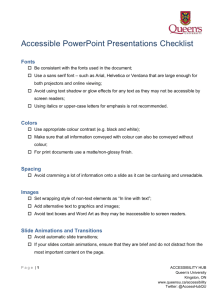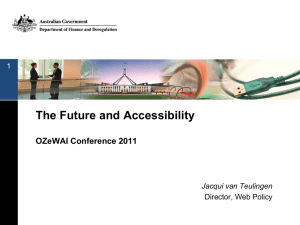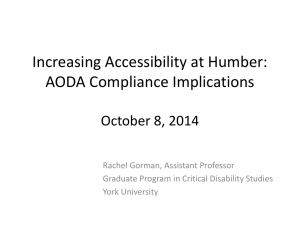3.5 Toolkit for Establishing an EETC on your Campus
advertisement
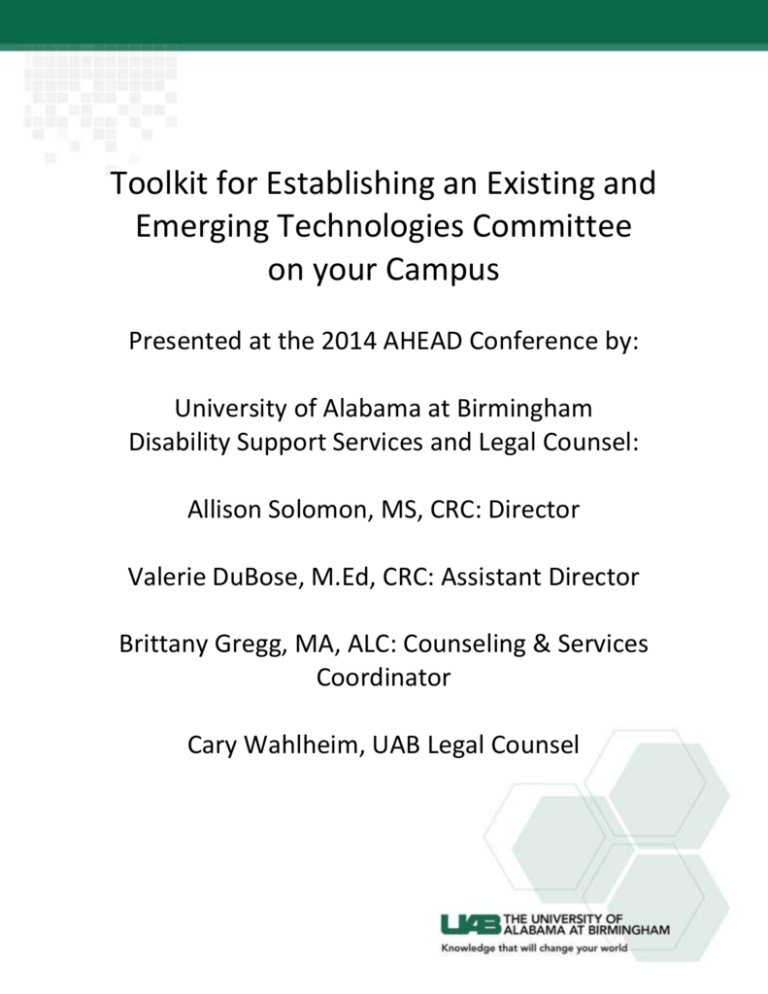
Toolkit for Establishing an Existing and Emerging Technologies Committee on your Campus Presented at the 2014 AHEAD Conference by: University of Alabama at Birmingham Disability Support Services and Legal Counsel: Allison Solomon, MS, CRC: Director Valerie DuBose, M.Ed, CRC: Assistant Director Brittany Gregg, MA, ALC: Counseling & Services Coordinator Cary Wahlheim, UAB Legal Counsel Table of Contents: Feedback from Committee Members Steps for Establishing an EETC on your Campus Sample Invitation Letter Sample Agendas for Committee Meetings Sample Committee Meeting Minutes Case Law Summaries Additional Resources Presenters’ Contact Information Feedback from the DSS Existing & Emerging Technologies Committee Members “The DSS Existing & Emerging Technologies Committee (EETC) is a multidisciplinary team that provides opportunities for campus leaders to learn about the importance of accessibility and the role their decisions play in guaranteeing access for all. UAB is committed to ensuring equal access for faculty, staff, and students. The EETC puts us closer to that goal. It is cultivating an environment of awareness, information-sharing, and policy-making for the accessibility of both existing and emerging technologies utilized at UAB.” – Dr. Suzanne Austin, Vice Provost for Student and Faculty Success “The EETC is the one campus-wide committee that represents all student areas ranging from teaching faculty to purchasing agents, all focusing on the availability of content as it pertains to the Rehabilitation Act and Americans with Disabilities Legislation. Where else can you hear a physician and an IT specialist discuss how to make streaming videos accessible, or a Board of Trustees-level attorney providing summaries of recent litigation and how our campus procedures are or are not affected? The value to our campus is immeasurable.” – Dr. Tracee Synco, Director for Retention Initiatives and Academic Engagement “The Disability Support Services Existing and Emerging Technologies Committee (EETC) is creating a more inclusive environment for the UAB community. Bringing together representatives from all areas of campus to gain a better understanding of the tools available to help ensure accessibility is crucial. The conversations and subsequent actions of the EETC have created a safe place to discuss our weaknesses and build upon them to make UAB a better place for everyone. It is hard to imagine that we didn’t have such a group a few short months ago.” – Mr. Andy Marsch, Assistant Vice President for Student Life, ADA/504 Compliance Officer Steps for Establishing an EETC on your Campus Phase 1: Needs Assessment Consider the following questions to guide you in identifying the needs on your campus: What technologies are being used on your campus? Are these technologies accessible? What areas / technologies are in need of improvement? Is accessibility being considered when the institution enters into a contract with a vendor or chooses to purchase software / hardware? Are web pages and online learning environments being designed with accessibility in mind? Why is this committee needed on your campus? How will this committee benefit the institution as a whole? Phase 2: Identify Key Administrators Consider the relationships you already have with individuals and departments on campus who support this cause. Also consider what additional relationships would be beneficial to develop. Consider including individuals from the following areas: Legal Counsel Provost or Vice Provost Disability Services ADA / 504 Compliance Student Success / Retention Institutional Effectiveness / Analysis Online learning Academic Technology Faculty Senate Libraries Human Resources Media Relations Procurement / Purchasing Public Relations / Marketing Phase 3: Gather Support Compile results from the needs assessment you completed above. Identify case law examples which support the need for the committee. Find examples of similar committees at other institutions and the resulting benefits on their campuses. If you are a “one person” office, consult with other schools in your area. Meet with the appropriate administrator(s) on your campus to share your findings and request support in establishing this committee. Phase 4: Begin Establishing the Committee Consider the following to guide you in establishing the committee once you have received support from your administration: Who will write the invitation letter and appoint committee members? (sample letter provided). Will this involve a planning meeting between yourself and your co-chair(s)? Who will be in charge of scheduling the first meeting and when / where will it take place? How often will the committee meet? Create an informal committee timeline and develop goals for the first year. Use results from your needs assessment to identify departments or areas that may be in more immediate need of improvements and consider starting with them. Also consider current projects, or developments on the horizon, when formulating your timeline. For example, if your institution is switching to a new Learning Management System or in the process of revising its web development policy, you may want to start with those areas. Keep in mind you may have to support and / or educate some of your committee members regarding accessibility, and take time to learn more about their department / area. How will you advertise the committee to your institution to help with buy-in? How will you provide regular updates of the committee’s actions in order to gain excitement and momentum from other departments? What procedures will be in place for evaluating the effectiveness of the committee, and how will the evaluation be shared with committee members as well as administration? Sample Invitation Letter Dear DSS Existing and Emerging Technologies Committee Representative: UAB has a long tradition of fostering a diverse and innovative culture across the campus. Our values allow us to be flexible and responsive to the needs of our students, faculty, staff and the larger community. Due to recent court rulings, Office of Civil Rights (OCR) decisions, Department of Justice (DOJ) decisions and “Dear Colleague” letters from the Department of Education, it has been determined that the university is in need of a committee dedicated to ensuring accessibility as it relates to existing and emerging technologies utilized across the institution. I am inviting you to be a part of this multi-disciplinary committee that includes representatives from a variety of areas across campus. This group, the Disability Support Services (DSS) Existing & Emerging Technologies Committee, will be co-chaired by the Vice Provost for Student and Faculty Success and the Office of Counsel for the University of Alabama System. This committee is charged with coordinating a broad, institution-wide focus on the university’s obligation to provide equal access to all technology-based services, activities and information. Please acknowledge your willingness to serve on this important committee by responding to (insert Disability Services’ Director contact information here). I look forward to working with this committee to ensure that UAB provides an accessible environment for all. Your participation is essential in these efforts. Proposed membership for the DSS Existing & Emerging Technology Committee: (list each committee member’s name next to their department and indicate the co-chairs) Legal Counsel: Provost Office: Disability Support Services: ADA/504 Compliance Officer: Procurement/ Purchasing: Student Retention / Success: Institutional Effectiveness / Analysis: E-Learning: Technology: Faculty Senate: Libraries: Human Resources: Media Relations: Public Relations / Marketing: Sincerely yours, (Signed by the President of the University) Sample Agendas for Committee Meetings First Meeting: Disability Support Services (DSS) Existing & Emerging Technologies Committee AGENDA Introductions of committee members Committee Charge: To ensure accessibility for existing and emerging technologies utilized by the institution and coordinating accessibility to comply with the university’s obligation to provide equal access to all technology-based services, activities and information. It has been recommended that institutions create a committee of professionals who are positioned to create an awareness of the university’s responsibility to make choices and develop policies which will create an accessibility environment for all students. Recent court rulings, the Office of Civil Rights (OCR) decisions, Department of Justice (DOJ) decisions and “Dear Colleague” letters from the Department of Education all further support the need for this committee. Overview of the Issues (Legal Counsel) Committee Goals (Director of DSS) Accessibility Examples from other Institutions (DSS Assistive Technology Specialist) Areas this committee will explore: Contracts Choosing to purchases software (LMS, email systems, operating systems) Choosing to purchase hardware (wifi/internet access points, audio/visual systems) Creating databases Development and maintenance of webpages, online classes Planning and implementation phase of university events (Student Life activities, posting of the president’s state of the university address, videos from UAB media) Faculty development opportunities (currently offering courses through the Center for Teaching and Learning) Problem solving within our current framework (current technologies at UAB may not always ensure accessibility) Next meeting will be __________________. Our first focus issue will be applying accessibility awareness to university contracts. Second Meeting: Disability Support Services (DSS) Existing & Emerging Technologies Committee AGENDA Welcome Co-Chair from the Provost Office Trending: Recent Case Law, Court Rulings Co-chair from Legal Counsel Considering Accessibility Needs for UAB Contracts Contracts Disability Support Services Policy Development Disability Support Services Director for Retention Initiatives and Academic Engagement Next meeting will be ____________ Third Meeting: Disability Support Services (DSS) Existing & Emerging Technologies Committee AGENDA Welcome Disability Support Services Trending: Recent OCR Ruling Co-chair from Legal Counsel Incorporating Accessibility into Institutional Processes Institutional Effectiveness & Analysis Technology Assistance for Faculty & Staff Assistive Technology Specialist from Disability Support Services Policy Development Update Director for Retention Initiatives and Academic Engagement Next meeting will be _______________ Sample Committee Meeting Minutes DSS Emerging & Existing Technologies Committee Meeting- Date Committee members in attendance: Committee members absent: Synopsis of meeting: Co-Chairs started the meeting off by inviting introductions from all the committee members in attendance. Co-Chair _________ informed the committee of the university’s responsibilities regarding the Americans with Disabilities Act 1990. The DSS Existing & Emerging Technologies Committee accepted the charge to consider accessibility before implementing university policies and technologies for the use of students. The committee discussed the various ways accessibility must be considered: Classroom Technology Contracts IT Web Content _______________ led the committee in the discussion of considering ADA and students with disabilities when submitting contracts for approval. UAB Procurement/Purchasing is adapting their procedures to ensure accessibility. They are considering accessibility in the bidding process, and they are looking for language that is specific to accessibility requirements in the contracts. _______________ led the committee in discussion about policy development for the university. The committee voted to revise the policy on web content accessibility guidelines. The recommended revision was made and voted in by all committee members present. Case Law Summaries and References University of Montana Resolution Agreement: https://nfb.org/images/nfb/documents/pdf/agreement_university_of_montana_march_10_20 14.pdf Complaint: university was using inaccessible electronic and information technology (EIT) including: the learning management system, library database materials, registration system, clickers, and uncaptioned videos Actions: university will take the following actions to ensure EIT is accessible to students with disabilities: Develop accessibility policy and procedures regarding EIT, distribute to faculty and staff, and provide training to faculty and staff Conduct an audit of the accessibility of EIT used by students, faculty and staff with disabilities Develop procedures regarding the procurement of accessible EITs that meet the accessibility standards of WCAG 2.0 and Section 508 EIT accessibility training for faculty and staff who develop or post content on any university website or use any EIT EIT Coordinator hired or designated as the person responsible for coordinating EIT accessibility policy and procedures on behalf of the university University’s library website and all webpages published or hosted by the university must be made accessible to meet WCAG and Section 508 standards Louisiana Tech University Settlement: http://www.ada.gov/louisiana-tech.htm Complaint: university was using inaccessible online learning products for tutorials, homework, administering exams, etc. Actions: Adopt policies ensuring that individuals with disabilities will not be excluded from participation in or denied the benefits of services, programs, and activities of the university or be subjected to discrimination by the university Ensure that the university’s disability services office acts as a liaison between students and faculty, responds to requests in a timely manner, takes an active role in ensuring accommodations are provided, and serves as the main contact regarding ADA compliance and resolution of disability-related complaints Ensure that opportunities available to all university students are equally available to students with disabilities Provide ADA training to all individuals who provide course-related instruction as well as university administrators South Carolina Technical College System Resolution Agreement: http://www2.ed.gov/about/offices/list/ocr/docs/investigations/11116002-b.pdf Complaint: website accessibility (incompatible with assistive technology) Actions: College system will issue an annual directive citing information about website accessibility standards, and the expectation that the college conduct annual website reviews and submit a report documenting the review as well as steps to correct identified problems College system will develop a resource guide regarding web accessibility requirements; guide will be made available to faculty and staff designing website and online courses 2010 Department of Justice and Department of Education “Dear Colleague” letter regarding the use of electronic book readers: http://www2.ed.gov/about/offices/list/ocr/letters/colleague-20100629.pdf Additional Resources “Best and Worst College Web Sites for Blind Students” in The Chronicle of Higher Education, December 2010: http://chronicle.com/article/BestWorst-College-Web/125642/ AHEAD Regional Affiliates Legal Resources www.ahead.org http://ahead.org/affiliates http://ahead.org/resources/legal ADA Information Line 800-514-0301 (voice), 800-514-0383 (TTY) http://www.ada.gov/ada_info.htm Disability Compliance for Higher Education www.disabilitycomplianceforhighereducation.com Salome Heyward & Associates 508-833-9974 http://salomeheyward.info/ Salome Heyward is a civil rights attorney with over 30 years’ experience in disability discrimination law. Salome Heyward & Associates offers a broad range of ADA, Section 504 and Section 508 compliance-based services. Presenters’ Contact Information University of Alabama at Birmingham Disability Support Services 205.934.4205 dss@uab.edu www.uab.edu/dss Allison Solomon – Director, Disability Support Services 205.934.4205 asolomon@uab.edu Valerie DuBose – Assistant Director, Disability Support Services 205.934.4205 vdubose@uab.edu Brittany Gregg – Counseling & Services Coordinator, Disability Support Services 205.934-4205 bmgregg@uab.edu Cary Wahlheim – UAB Legal Counsel 205.934.3474 ctw@uab.edu
